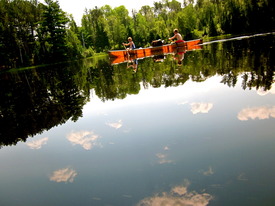Benefits of Going Off the Beaten TrackCenter for International and Cultural Education
Look, you're you, right? You're unique. While you probably share a number of things – interests, ideas, experiences – with any one of your peers, nobody else is exactly the you that you are.

Given that only you can judge what is the right fit for you, Gustavus maintains a robust list of study away offerings. For this reason, you are not limited to the most popular options or the well-trod pathways, and it may be worthwhile to consider one of the less well traveled options for global learning that really fits for you.
Below, we provide some of the reasons you might want to consider less commonly chosen program options, each paired with some highlighted program opportunities:
1. Why limit yourself to one country?
Traditionally, study away is based in one location within one country but, as both academic fields and world activities (commerce, research, attempts to mitigate climate change) become increasingly global, so do the program opportunities. Some programs allow you to study in two or more countries in one semester.
Advantage: The comparative model allows for an approach to a core topic or your main subject area with multiple, shifting perspectives that enrich your view of the material.
Disadvantage: You will know less about each location visited and will not develop as extensive an expertise on any one of the locations/cultures involved, when compared to those who stay in one site for an entire term. You also magnify your carbon footprint in multiple-location programs (because you travel more to move between sites).
Highlighted options:
- Politics and Religious Integration in the Mediterranean (Tunisia and Italy) is an amazingly rich program, with a main base in Tunisia and a three-week study session in Palermo (on the Italian island of Sicily) in the middle of the term
- CIEE Open Campus Global Scholars program allows you to mix-and-match up to three locations from an expanding list of options all around the world
- International Honors Programs investigate a specific topic in a comparative way in four different countries on four different continents (one of which is the US/North America). There is no other program like this.
2. Do you want to engage in hands-on research?
While many study away courses – like courses offered on campus – will include a research paper assignment, some programs immerse you more fully in your own original research (with lots of guidance) or allow you to join a team already involved in intensive research in an area of interest to you.
Advantage: You get the hands-on experience that will be a gold star in your grad school and/or job applications, and you may even get your first publication or contribute to solving a real problem.
Disadvantage: The research experience replaces one or more 'traditional' courses for the semester, so you may not make quite as much progress on some of your other objectives.
Highlighted options:
- The Euroscholars program allows you to join a research team in one of many universities around Europe in the second semester of junior year or first semester of senior year. There are projects in social sciences (including economics), humanities, and natural sciences. Usually the research work is close to full-time and accounts for most of your course work, though you may also have the option to take a course in the country's main language and/or a culture course.
- Many SIT programs include the option to complete an intensive, self-directed research project related to the program's overall theme. Topics are generally in the areas of sustainability, conservation, climate change, social justice and social change, migration, and interreligious cooperation.
- The ISLE program in Sri Lanka is purpose-built to prepare students to learn effectively and quickly about this seldom-visited part of the world and then to conduct an independent research project in the final month of the semester. Gusties have had remarkable experiences researching topics like how Sri Lankans of different faiths view and try to prevent suicide, or how a remote village community is affected by the nearest Buddhist temple's influence. Topics include religion, peace and conflict, sustainability, natural medicine, gender studies, and development studies.
3. Do you want to go somewhere that few (U.S.) college students go?
Sure, Italy and Spain and England are all amazing and, if that's where you want to go, there's nothing wrong with that. But maybe you're one of those more adventurous souls who is interested in going further afield of the places that see lots of US students. Less commonly chosen destinations are not uninteresting – they just don't get as much attention because fewer students choose them. Some of the most amazing adventures begin with the decision to go somewhere unique.
Advantage: You will still get your study away term while also adding a much more unique experience to your repertoire. Sometimes this unique experience becomes a major benefit in grad school or future employment.
Disadvantage: When everyone compares notes on their Italy stories, you may not have one to share. (But you can always change the subject to Nepal or Uruguay!)
Highlighted options:
- Forests in the Land of the Thunder Dragon (Bhutan)
- Race, Identity, and Ethnicity in Colombia
- American University of Central Asia (Kyrgyzstan)
- People, Environment, and Climate Change in Patagonia and Antarctica (Yes, that says "Antarctica." We know...)
4. Do you want to be the change you wish to see in the world? (Study social justice!)
While a lot of study away opportunities offer more 'standard' course work, some programs are designed in collaboration with local communities and aim to address social injustices, climate change, and other pressing, global problems. You might learn directly from indigenous people, examine post-conflict processes and what is holding the fragile peace together, or try to help local community members as they design and implement new approaches to problems that need solving.
Advantage: Apart from feeling good about the fact that your study away was socially engaged, you may be able to help with real-world solutions, or you may just greatly improve your own ability to identify injustices and examine your own culpability for them. You will expand your toolset to be a part of the solutions across your lifetime.
Disadvantage: With the zoomed-in topics in this program model, students whose majors are outside related areas (e.g., Peace, Justice & Conflict Studies; GWSS; Environmental Studies; Political Science; LALACS; etc.) may not make as much major/minor progress while engaged in this model.
Highlighted options:
- HECUA programs are deeply community-based and rooted in values like reciprocity, radical equality, and sustainability. Gusties have loved these programs for years, as Gustavus is a longtime consortium member school. There are both US (including Twin Cities!) and international options.
- The SOAS program in London takes a broad view of Afrian, Asian, and Middle Eastern studies and is known globally as an institution promoting social change. (Their students recently went on a short strike to protest the number of European authors included among the readings in some of the courses that focus on, well... not Europe.)
- The USAC Poland program offers a track in Jewish and Holocaust studies in one of the best places to engage with those fields (especially Holocaust studies). Of course, there are also Israel programs, and these allow for study of the sociopolitical conflicts within Israel's segmented lands and other parts of the MENA region as well as both Hebrew and Arabic language studies for those who are interested.
5. Do you want to experience intensive immersion in natural settings?
We have the Arb at Gustavus, but the average student does not spend the majority of their learning time outdoors while resident on the St. Peter campus. There are study away programs, though, that involve living in deep harmony with natural surroundings and incorporating that experience as part of the learning.
Advantage: You will develop an extraordinary and unique perspective on the relationship between humans and our environments that may inform your future work, choices in your personal life, and even the communities to which you belong.
Disadvantage: You will have to adapt to an experience that is less 'wired,' quieter, and more removed from the bustle of contemporary life, and that may mean feeling disconnected or sometimes isolated (though that's all part of experiencing what it means to be 'in nature').
Highlighted options:
- The Oregon Extension program delves deeply into theory and philosophy about what it means to be human, what makes a community, and what our relationship with nature ought to be – all while living in a rustic, breathtaking setting in the Oregon moutain forests. 100% unique! (Fall semester only)
- School for Field Studies programs involve your hands-on efforts in ongoing climate, conservation, and ecological research (running projects with growing bodies of knowledge) and include living in tents, cabins, and field stations that are all just a little removed from urban life. Small groups make for wonderful group bonding over shared interests!
6. Do you want to complete an internship and gain practical experience?
While many students might think of study away as one thing, and having an internship as another, you can in fact combine the two into one experience, studying away from campus while completing an internship at the same time. In some programs, the internship is full-time (or nearly full-time) while, in others, it may just take the place of a single semester course.
Advantage: Gaining workplace/professional experience with hands-on involvement while also making progress toward your Gustavus degree.
Disadvantage: Some folks might fear that maintaining a significant work schedule distracts from the possibility of spending a lot of daytime hours experiencing your study site firsthand. There's some truth to this – though internships also engage your learning and increase your cultural understanding in their own, unique ways.
Highlighted options:
- Absolute Internship is Gustavus' partner for custom-created internships in Stockholm, Sweden. Live in a res hall-type setting with interns from around the world and enjoy study away benefits like excursions and company visits plus evening professional-development workshops. There are summer opportunities available for this experience.
- Both CIS and CIEE offer programs where customized, full-time internships are available. Again, these partners offer all the study away-type supports and activities.
- The Washington Internship Institute program combines a (mostly) full-time internship with one other course and is an amazing option for students interested in law, politics, lobbying, NGOs, trade policy, diplomacy, and related career tracks. It's available for both semester and summer experiences.